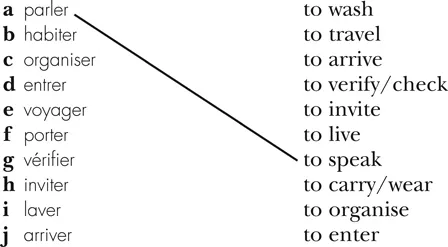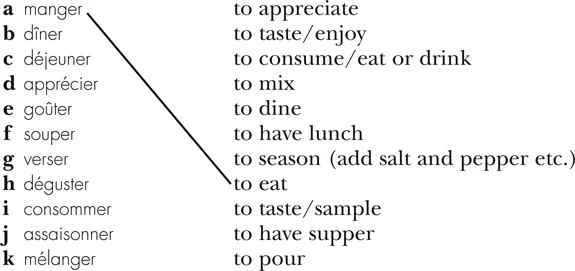
eBook - ePub
French Grammar Made Easy
Rosi McNab
This is a test
Buch teilen
- 204 Seiten
- French
- ePUB (handyfreundlich)
- Über iOS und Android verfügbar
eBook - ePub
French Grammar Made Easy
Rosi McNab
Angaben zum Buch
Buchvorschau
Inhaltsverzeichnis
Quellenangaben
Über dieses Buch
French Grammar Made Easy is the ideal introduction to the basics of French grammar for anyone new to the language or looking to refresh their knowledge.
The Grammar features:
-
- concise and jargon-free explanations supported by examples
-
- exercises throughout to reinforce learning
-
- a "fast-track" option for more advanced learners
-
- a full answer key, making the Grammar ideal for self-study.
French Grammar Made Easy presents the essential patterns and rules of the French language in a clear and accessible manner. It is the ideal Grammar for those wishing to supplement their learning and move beyond the phrasebook level.
Häufig gestellte Fragen
Wie kann ich mein Abo kündigen?
Gehe einfach zum Kontobereich in den Einstellungen und klicke auf „Abo kündigen“ – ganz einfach. Nachdem du gekündigt hast, bleibt deine Mitgliedschaft für den verbleibenden Abozeitraum, den du bereits bezahlt hast, aktiv. Mehr Informationen hier.
(Wie) Kann ich Bücher herunterladen?
Derzeit stehen all unsere auf Mobilgeräte reagierenden ePub-Bücher zum Download über die App zur Verfügung. Die meisten unserer PDFs stehen ebenfalls zum Download bereit; wir arbeiten daran, auch die übrigen PDFs zum Download anzubieten, bei denen dies aktuell noch nicht möglich ist. Weitere Informationen hier.
Welcher Unterschied besteht bei den Preisen zwischen den Aboplänen?
Mit beiden Aboplänen erhältst du vollen Zugang zur Bibliothek und allen Funktionen von Perlego. Die einzigen Unterschiede bestehen im Preis und dem Abozeitraum: Mit dem Jahresabo sparst du auf 12 Monate gerechnet im Vergleich zum Monatsabo rund 30 %.
Was ist Perlego?
Wir sind ein Online-Abodienst für Lehrbücher, bei dem du für weniger als den Preis eines einzelnen Buches pro Monat Zugang zu einer ganzen Online-Bibliothek erhältst. Mit über 1 Million Büchern zu über 1.000 verschiedenen Themen haben wir bestimmt alles, was du brauchst! Weitere Informationen hier.
Unterstützt Perlego Text-zu-Sprache?
Achte auf das Symbol zum Vorlesen in deinem nächsten Buch, um zu sehen, ob du es dir auch anhören kannst. Bei diesem Tool wird dir Text laut vorgelesen, wobei der Text beim Vorlesen auch grafisch hervorgehoben wird. Du kannst das Vorlesen jederzeit anhalten, beschleunigen und verlangsamen. Weitere Informationen hier.
Ist French Grammar Made Easy als Online-PDF/ePub verfügbar?
Ja, du hast Zugang zu French Grammar Made Easy von Rosi McNab im PDF- und/oder ePub-Format sowie zu anderen beliebten Büchern aus Languages & Linguistics & French Language. Aus unserem Katalog stehen dir über 1 Million Bücher zur Verfügung.
Information
1
VERBS
1.1 Talking about doing things
Why verbs first? Because verbs are so important. They are the ‘glue’ that holds a language together. A noun is just the name of something or someone, it can be singular or plural, but a verb is used to tell [or ask] you something. In many languages verbs are ‘codified’ to tell you who or what is doing it or when it happens. In English we usually stick a lot of verbs together: He was running, I would like, Did you know? … but in French they usually add a different ending to the verb. Il courait, je voudrais, vous saviez?
►► If you know what a verb is, go on to 1.1.1.
You use a verb to talk about what someone or something does, is doing, has done or intends to do. A verb is often called a doing word.
To find out if a word is a verb, ask yourself if it is about doing something.
I Which of these words are things you can do?
- run
- jeans
- sleep
- make
- easy
- eat
- under
- blue
- think
- after
Some words can be used as verbs, nouns or adjectives, e.g. play can be a play at the theatre or part of the verb to play.
Ask: Are they ‘doing’ it? If they are, it is a verb.
II Which of the highlighted words are being used as verbs?
- Jason and Lily run a homework club in the church hall.
- They go for a run every morning.
- They both work at the local school.
- After work they go straight to the hall.
- Tonight they are having a meeting to discuss funding.
- They are meeting in the church hall.
- They need more chairs for the children.
- Jason usually chairs the meetings.
- Lily records the proceedings and types them up.
- The records show that they have met three times this year.
1.1.1 What is the infinitive?
►► If you know what the infinitive is, go on to 1.1.2.
When you look up a verb in a dictionary, you will find the infinitive. This is the ‘name’ of the verb.
In English, the infinitive consists of to + verb, e.g. to read, to buy, to travel.
III Here are some French infinitives. You probably know some of them already or can guess what they mean. See how many you can match up with their English counterparts.
Try to look for similarities between the French and the English. Some are obvious: for example, organiser means to organise. Others are less obvious, such as laver meaning to wash (a lavatory was the place where people used to wash) and porter meaning to carry (a porter was someone who carried something).

IV The verbs in III are usually referred to as ‘-er’ verbs (pronounced E.R.) because they end in -er. Here are some more -er verbs. How many of them do you know already? They all have to do with food and eating.

If you find it difficult to learn new words, try to find a ‘hook’ to hang them on: e.g. manger, a manger where you put the food for an animal. And if you have travelled in France, you will almost certainly have seen signs at places selling wine, saying Dégustation, which means they are inviting you to sample their wines.
More than 50% of English words derive from French words or have the same stem. If you don’t know a verb, try saying the English word with a French accent – you have a 50% chance of being understood!
New words made into verbs are usually -er verbs: e.g. faxer = to fax; surfer = to surf; monopoliser = to monopolise, etc.
V What do you think the French for these verbs would be? Cover up the French and see if you can work it out.
| a to decide... |